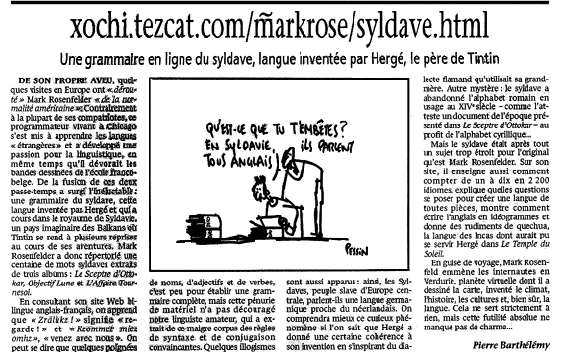


By his own admission, several trips to Europe threw Mark Rosenfelder "off the beaten path of American normality." Unlike the majority of his compatriots, this programmer living in Chicago set himself to learning "foreign" languages and developped a passion for linguistics, as well as for comics of the Franco-Belgian school. From the fusion of these two pastimes came the inevitable: a grammar of Syldavian, the language invented by Hergé, spoken in the kingdom of Syldavia, an imaginary Balkan country where Tintin returns several times in the course of his adventures. Mark Rosenfelder thus inventories a hundred or so Syldavian words taken from three albums: King Ottokar's Sceptre, Objective: Moon and The Calculus Affair.
Consulting his bilingual English-French website, one learns that Zrälùkz! means "Look!", and Kzommet micz ohmz, "Come with us!" A fistful of nouns, adjectives, and verbs isn't much for establishing a complete grammar; but this lack of material did not discourage our amateur linguist, who extracted from this meagre corpus rules of syntax and plausible conjugations.
Several illogicalities were noticed: for instance, the Syldavians, a Slavic people of Central Europe, speak a Germanic language close to Dutch. This curious phenomenon can be understood better when one learns that Hergé gave a certain coherence to his invention by basing it on the Flemish dialect spoken by his grandmother. Another mystery: Syldavian abandoned the Roman alphabet used in the 14th century-- as a document printed in King Ottokar's Sceptre attests-- in favor of the Cyrillic alphabet.
But Syldavian was after all too narrow a subject for the original spirit of Mark Rosenfelder. On his site, he also teaches how to count from 1 to 10 in 2200 languages, explains what questions to ask oneself to create a language from scratch, shows how to write English in ideograms, and gives the basics of Quechua, the language of the Incas-- which Hergé could have used in The Temple of the Sun.
In the form of a travel guide, Mark Rosenfeld takes internauts to Verduria, a virtual planet for which he has drawn the map and invented climate, history, cultures, and, of course, the language. All this doesn't have, strictly speaking, any purpose, but this absolute futility is not without charm...
--Pierre Barthélémy
I wonder how many readers, however, couldn't figure out where the ~ was supposed to go, and never found the page. Non mais!